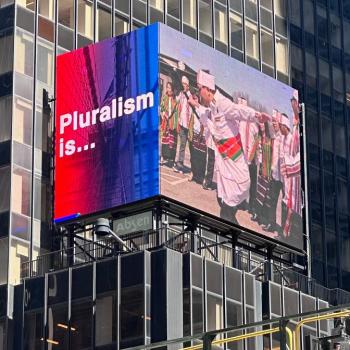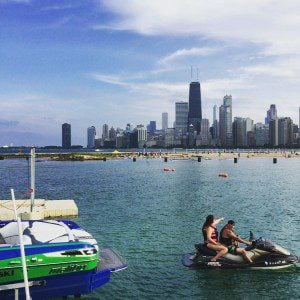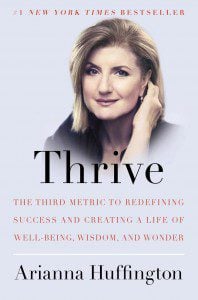Two of my favorite quotes have been coming to mind recently as I reflect on the fresh start of a new calendar year. The 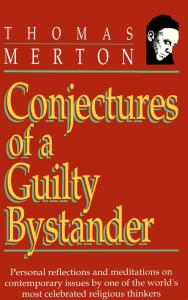 first quote is from the Roman Catholic monk Thomas Merton, who was both a contemplative, cloistered in a monastery, and an activist, heavily involved in corresponding and meeting in person with those at the forefront of creating social change in the 1960s. In his book, Conjectures of a Guilty Bystander:
first quote is from the Roman Catholic monk Thomas Merton, who was both a contemplative, cloistered in a monastery, and an activist, heavily involved in corresponding and meeting in person with those at the forefront of creating social change in the 1960s. In his book, Conjectures of a Guilty Bystander:
There is a pervasive form of modern violence to which the idealist…most easily succumbs: activism and over-work. The rush and pressure of modern life are a form, perhaps the most common form, of its innate violence. To allow oneself to be carried away by a multitude of conflicting concerns, to surrender to too many demands, to commit oneself to too many projects, to want to help everyone in everything is to succumb to violence. The frenzy of the activist neutralizes [his or her] work…. because it kills the root of inner wisdom, which makes work fruitful. (86)
I find two parts of that quote particularly salient. First, that a social activist’s admirable commitment to social justice can itself become disordered so that instead of creating more peace and justice, it unintentionally becomes a form of violence against one’s own well being due to the stress of overcommitment. Moreover, the frenzy of activism that enacts violence against one’s self, can even more tragically undercut the efficacy of activism on the societal level — in Merton’s formulation, “because it kills the root of inner wisdom, which makes work fruitful.” In other words, overcommitment can lead us to do many things poorly instead of potentially a few things with excellence.
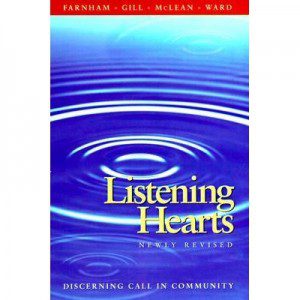 Related to Merton’s concern of activism and over-work, the following is a quote from the book Listening Hearts: Discerning Call in Community:
Related to Merton’s concern of activism and over-work, the following is a quote from the book Listening Hearts: Discerning Call in Community:
Even when a need exists and we are well qualified to meet it, we are not necessarily called to respond to it. Something may seem logical for us to do, but that does not mean that [we are] call[ed] to do it…. Simply because a task or undertaking is good to do, does it mean that we are called to do it or that we should continue doing it? To be doing good can be the greatest obstacle to doing something even better.
The final line of that quote seems especially significant to me: “To be doing good can be the greatest obstacle to doing something even better.”
As I learned in a class I took a few years ago on discernment, one of the most basic parts of practicing discernment is learning to choose good over evil. Although, in some of the most pressing social concerns of our day, good and evil can seem frustratingly intertwined, there is also often a clear difference we can learn to see between choosing, for example, wrath, greed, sloth, pride, lust, envy, and gluttony versus choosing wisdom, justice, generosity, persistence, peace, compassion, and humility. I’m playing here on the so-called Seven Deadly Sins and Seven Virtues from the Christian tradition, but I could just as easily have drawn from the Ten Qualities that lead to Buddhahood (generosity, renunciation, wisdom, strength, effort, truthfulness, determination, loving-kindness, equanimity) over the Ten Fetters (self-identity, doubt, clinging, craving, ill-will, attachment, comparison, restlessness, and ignorance).
Now, I’m not saying that it’s always easy to choose good over evil. Instead, I’m saying that the quote we considered earlier that, “To be doing good can be the greatest obstacle to doing something even better,” challenges us to see that the subtle distinction of choosing the “best” over the good or better is often much more difficult than choosing good over evil. Choosing the best — choosing what is most authentically ours to do, choosing the path, in Frederick Buechner’s words, that is at that intersection “where your deep gladness and the world’s deep hunger meet” — that choice is a much harder discernment and commitment than simply choosing the good over the bad. And allowing ourselves to do a thousand good things can distract us from the more fulfilling and ultimately more productive choice of doing a few things that we are most authentically gifted and able to do superlatively well. The question then becomes discerning “What is authentically and life-givingly mine to do?” and “What is authentically mine not to do?” — because both saying “yes” and saying “no” with intention are important spiritual practices.
That being said, allow me to add one more twist to the equation. What this perspective is calling us toward is more than being less busy. While, yes, on one level it is about avoiding too many distractions. As our Thoreau said in Walden:
Our life is frittered away by detail. An honest man has hardly need to count more than his ten fingers, or in extreme cases he may add his ten toes, and lump the rest. Simplicity, simplicity, simplicity! I say, let your affairs be as two or three, and not a hundred or a thousand; instead of a million count half a dozen, and keep your accounts on your thumb nail.
On the other hand, I believe we’re called to more than just simplicity and less busyness. We’re called to seek what some philosophers call “human flourishing,” what Jesus called the “abundant life.”
Let me give you an example. This summer, as part of the long process of coming into full fellowship with the Unitarian Universalist Association, I was required to complete a unit of Clinical Pastoral Education. That required driving an hour away (sometimes more in traffic) for a class twice a week for 10 weeks, which all total amounted to the equivalent of two-and-a-half 40-hour weeks stacked on top of my normal workload in my congregation. And, to be honest, I unfortunately found CPE to about “30% helpful and 100% required.” And I shared some of the many valuable insights I learned in that 30% of the program in a post back in November on “After Trauma & Loss: What (Not) To Say.” But my emphasis in this post is the opposite of my point in that post. As grateful as I am for the 30% of the program that I found valuable, being required to spend the summer — my favorite season of the year — working overtime to complete a program that I found to 70% a waste of my time was extremely enervating. I frequently left the CPE classroom feeling drained of energy and sometimes resentful and angry. On one level, of course, I was aware, as the Buddha teaches, that I was contributing to my own suffering. But on another level, I was reacting to what felt like a legitimate waste of my time. Fortunately, I forced myself to have an attitude adjustment about a third of the way through the program and again at the halfway point that helped me persevere.
But consider this comparison. Not long after CPE ended this summer, I found that in the fall, I had overcommitted myself (of my own choosing) for a brief period in a way I hadn’t fully anticipated. For six weeks, starting in mid-October I was preaching on Sunday mornings, teaching a class on “Banned Books of the Bible” at a local Community College on Mondays, and teaching “Building Your Own Theology” in my congregation on Tuesdays. That was three major presentations I had to prepare each week in a row on top of my other responsibilities. But here’s the important part. I was even busier during that six week period this fall than during the 10-weeks I did this summer, but internally the two workloads could not have felt more differently. Whereas CPE left me feeling disconnected, disgruntled, and drained of energy, the back-to-back-to-back preaching and teaching this fall left me tired, but in a good way — as in ready for a well-earned rest after good, fulfilling work.
One term that comes to mind to describe the difference is what Marx called “Alienated Labor.” Marx meant a lot by that term, including the negative consequences of workers not being in control of the means of production. But that term “Alienated Labor” also points toward work that we’re forced to do that does not employ our autonomy, creativity, and gifts — and that leaves us feeling enervated instead of energized.
To connect this dynamic back to the question of what is yours to do (and not to do) in this new year, one of my favorite metaphors for discernment is swimming with or against the current of a river. I’ve found over and over the past few years that resolutions that are too far outside my wheelhouse (such as, for me, completing that CPE unit this summer or taking guitar lessons) feel like I’m swimming in a river against the current: no matter how much effort I exert and how hard I swim, I make little or no progress, and end up frustrated and exhausted. But with other projects that comparatively require much more work (such as my preaching/teaching load this fall, completing a doctoral degree, or finishing a triathlon) feel like I’m swimming with the current. I can feel myself moving rapidly, even if it is a long swim. And in the end, I’m left more invigorated than exhausted.
And since this past Sunday was “Twelfth Night,” the 12th Day of Christmas in the Christian tradition, allow me to give me one further example. Christmas importantly commemorates the birth of Jesus, but one of the reasons that I was drawn to transfer from Liberal Christianity to Unitarian Universalism is that I think it is unhelpful to focus our religious and spiritual life too much on the life of one, male historical individual. Instead, I see Jesus as one among many prophetic figures who should inspire us. Moreover, I think that the historical Jesus would agree with me that, in the end, the point is not imitating the life of any one individual, it is building what Martin Luther King, Jr. called the Beloved Community.
Said differently, I think that Rabbi Jesus would agree with the old Hasidic story that Rabbi Zusya told on his deathbed. He said, “In the world to come I shall not be asked, ‘Why were you not Moses?’ I shall be asked, ‘Why were you not Zusya?’”So, in this new year, the question is more than “Why are you not more like Moses or Miriam, Jesus or Gandhi, Buddha or MLK.” The question is:
- Who are you?
- Why are you not fully yourself?
- “Where [does] yourdeep gladness and the world’s deep hunger meet”?
- What is most authentically yours to do?
And not just the many “good” things to do, which can be a distraction, but the “best” — those activities, practices, people, place, and things, which help make manifest your best, most superlative self.
What is yours to do in 2014?
And what is your not to do?
To help with your discernment, I will end with an abbreviated series of questions from a list I was given as part of the “Choose Health” Wellness pilot program I am currently part of for UU ministers. We were asked to reflect on what is authentically ours to do in regard to seven areas. May these questions help prompt your discernment of what to let go of and what to affirm in this new year:
- Physical Wellness: When or how do you feel physically alive, your body skillfully engaged? What would you like to do to feel this way more often?
- Emotional Wellness: When or how do you feel emotionally engaged? Let yourself dream about something that would add more joy to your life.
- Intellectual Wellness: When or how does your mind feel energized, buzzing with electric vitality?
- Financial Wellness: What would help you feel more comfortable with your finances?
- Social Wellness: When or how do you feel connected to those you love and value?
- Vocational Wellness: When or how do you feel fulfilled and optimistic in your work?
- Spiritual Wellness: What makes you fully alive [and connected to what we UUs call the Interdependent Web of All Existence]?
What do you feel called to let go of or to say “yes” to in 2014?
The Rev. Dr. Carl Gregg is a trained spiritual director, a D.Min. graduate of San Francisco Theological Seminary, and the minister of the Unitarian Universalist Congregation of Frederick, Maryland. Follow him on Facebook (facebook.com/carlgregg) and Twitter (@carlgregg).
Learn more about Unitarian Universalism:
http://www.uua.org/beliefs/principles





